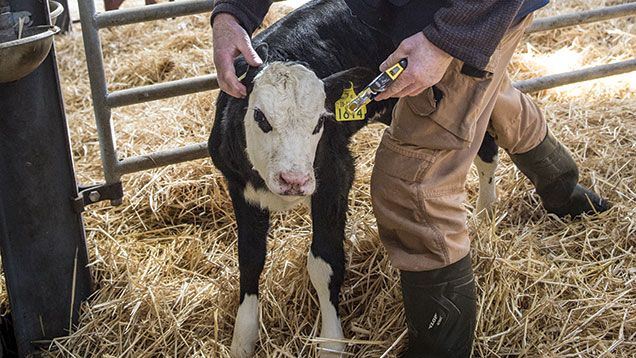NI to introduce mandatory BVD testing for newborn calves
 © Steffan Hill
© Steffan Hill Northern Ireland is following Scotland’s lead and introducing legislation that will make testing for bovine viral diarrhoea (BVD) in newborn calves compulsory.
Under draft legislation unveiled this week by Michelle O’Neill, the Northern Irish minister of agriculture and rural development, testing for the BVD virus in newborn calves, including stillbirths and abortions, will become mandatory.
Mrs O’Neill will introduce the proposed rule change for consideration by the Committee for Agriculture and Rural Development on 8 December, with a view to it coming into force on 1 March 2016.
See also: Farmers keen to tackle BVD, survey shows
“We have good reason to believe that through the application of this legislation, we will be taking an important step towards eradicating BVD from the herd in the North,” she said.
“That would certainly be a considerable achievement and will bring BVD compulsory testing here in line with the rest of Ireland.”
Voluntary testing
Herd keepers in the Republic of Ireland are required to test all newborn calves for the BVD virus within the first 20 days of life.
A ban on the sale of calves without a negative result is also in place, and follow-up tests are required where persistently infected (PI) animals are identified.
BVD factfile
- Mainly spread by persistently infected (PI) cattle – those born with BVD having come into contact with the virus in the womb
- Infection can trigger mucosal disease, enteritis, reproductive problems, and a weakening of the immune system
- Mandatory BVD virus testing written into law in the Republic of Ireland and Scotland
A voluntary BVD testing scheme, run by industry-led Animal Health and Welfare NI (AHWNI), currently exists in Northern Ireland.
The voluntary eradication programme, which involves testing of ear punch samples for the BVD virus, began on 1 January 2013.
In a statement, the British Veterinary Association (BVA) said vets and farmers in Northern Ireland have been “well engaged” with the voluntary BVD initiative and are “keen to see it progress.”
See also: Dairy herd improves fertility by eradicating BVD
“With about half of Northern Ireland farmers involved, the uptake under the voluntary BVD testing scheme has been really promising,” said Simon Doherty, president of the BVA’s Northern Ireland branch.
“So it’s most welcome that Minister O’Neill has committed to the necessary introduction of compulsory testing, as part of the joined-up government, profession and industry approach that is crucial for the delivery of a successful BVD eradication programme in Northern Ireland,” said Mr Doherty.
Gain outweighs cost
Mrs O’Neill said the gap between this week’s announcement and the scheduled 1 March 2016 start date will allow AHWNI “to make any necessary operational arrangements.”
It will also give herd keepers time to use up leftover standard cattle identification tags, ahead of purchasing the new BVD tissue sample-enabled tags, she said.
In a statement, the NI Ministry of Agriculture and Rural Development said the additional cost to each herd keeper would be “relatively low.”
Industry contribution over a three-year period will total more than £5m, it said. But estimated financial gains by herd keepers in eradicating BVD would outweigh these costs “by a ratio of 10 to 1,” it added.
